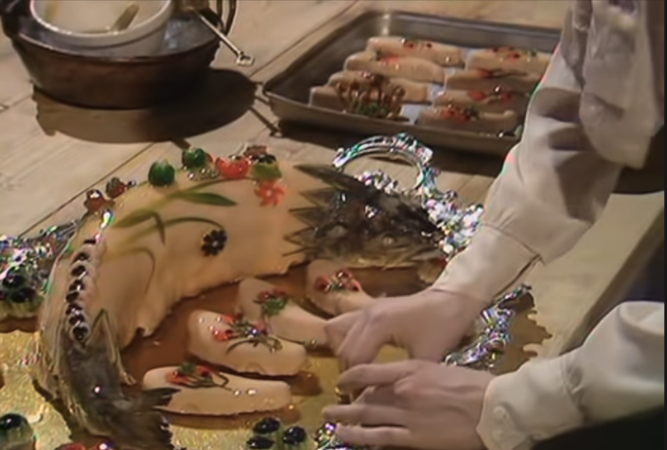
Ashley Spurgeon is a lifelong TV fan — nay, expert — and with her recurring television and pop-culture column "And Another Thing," she'll tell you what to watch, what to skip, and what's worth thinking more about.
I’ve spent the past couple of weeks enjoying the hell out of the ’70s British series of The Duchess of Duke Street, which — let’s get this out of the way right now — is a show with basically the exact same title as The King of Queens. Suggested for fans of: Downton Abbey; the time period running approximately from 1900-1925; and further works also created by John Hawkesworth, like Upstairs, Downstairs and The Adventures of Sherlock Holmes. We’re talking solid, respectable PBS-style drama, people. But considering The Duchess of Duke Street is also a true-ish biopic somewhat based on the life of a then-famous cook and hotiler, there’s a fair amount of old-timey great British baking to enjoy here, too. Observe:

Yummy yummy, salmon in aspic! Is there nothing these people can’t boil into a culinary masterpiece? I kid — the fictional Mrs. Louisa Trotter (Gemma Jones) is obviously a top-tier chef. She worked ’ard and worked her way up, from scrubbin’ veg and training under an exacting Frenchie in the grand, fine country houses of the English gentry. She cooked for kings, tzars and kaisers. Rumor has it she got a little money from Edward VII (scandalous!) to open up her ’otel, The Bentinck. And hey, speaking of kings and kaisers, as with anything Edwardian-set, our old friend dramatic irony is there in the form of The Great War, an ever-looming presence in the background.
What I like so much about Louisa is she’s not very likable at all. She’d absolutely hate me, because she hates journalists, writers and especially females of either profession. Or females of any profession: Having made it all on her own, without the vote, she side-eyes suffragettes. She’s the type of woman who hands out white feathers to any soldiering-age man she’s decided is a coward. And oh, Louisa’s a not-entirely-honest businesswoman, either: She pads hotel bills, hoards supplies during wartime, and finagles all sorts of special favors from her many, many high-placed friends. Yeah, yeah, beneath the gruff exterior she’s got a heart of gold. But when two of Louisa’s longtime friends are asked what they think is the secret of her success, the upper-class chum chalks it up to how she seems to know how to make people comfortable. Her lower-class friend? “I’d put it down to her being a snob and a bully.”
But Louisa comes by her bitchiness honestly (I think she’d respect me for calling her a bitch) — the only flintier person we meet is her mother; one of Louisa’s formative childhood memories is being locked away in the filthy cupboard under the stairs, Harry Potter-style. She was born lo- class and never got over the signifiers: her accent, her vulgar language. There’s an open, brassy brazenness about her; she is a force, and earned the respect she’s been granted by her clientele.
Louisa is also one of those interesting types you sometimes find in fiction and very often in reality -- a member of the lower classes who feels a protective sympathy and affinity for the aristocracy. (Louisa may not be a voter, but she’s clearly a Tory.) She’s not a slave who simpers over her master, but her hotel and talents are reserved for the well-to-do, a London-based home-away-from-country-home for the landed gentry. She’ll make her hotel a permanent home too, for the down-on-their-luck gentleman lucky enough to land on her good side.
Louisa’s best friend and sometimes lover Charlie Tyrell, Lord Haselmere, Viscount Something-or-Other (Christopher Cazenove) is arguably the most sympathetic upper-class twit you’ll ever come across — he’s handsome, jolly and affable, a pathos-laden version of a P.G. Wodehouse character. Being hella rich isn’t all it’s cracked up to be for your average Edwardian gent, and average is right to describe Charlie. He dreams of being a painter, but his talents are mediocre — everyone lies to his face, and his toffee-nosed friends mock him behind his back.
The Duchess of Duke Street isn’t shy about life’s harsh realities. I’m especially fascinated by the upper-class ladies of this era essentially raised to be permanent children, never told anything honest about sex, who then freak the fuck out the second they get married. This happens more than once! They’re not lucky enough to have been born low-class gutter children who at least learn the true ways of the world. Characters are driven to prostitution, suicide. Did this show make me cry? Oh God yes, more than once.
There’s proper old-school TV at work here: Build solid sets and let good actors do their thing with well-written, complicated characters. It’s currently available to view in ways that are not on paid streaming services (including on Hoopla, which is a service you can access with a library card), and even though The Duchess of Duke Street does follow one woman’s life, it’s also serialized; guests come and go, we follow their lives for a little bit, and everyone thoroughly enjoys Louisa’s cooking and company. Worse ways to spend a couple weeks.



